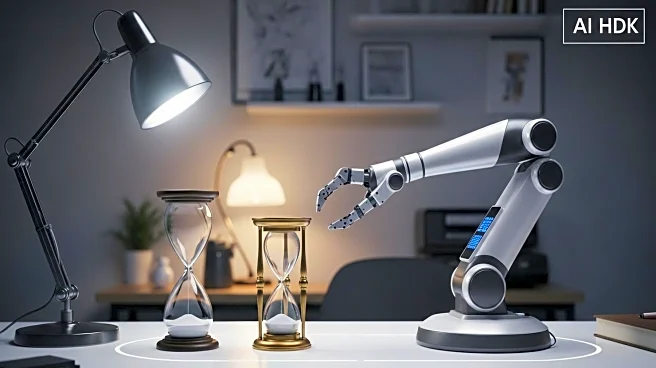What's Happening?
Artificial intelligence (AI) is increasingly being integrated into workplace environments to streamline tasks for employees across different generations. Generative AI (GenAI) is being utilized to draft and rewrite summaries, emails, letters, checklists, and translations based on simple prompts. This technology aims to reduce the time spent on typing and increase decision-making efficiency. GenAI can summarize lengthy emails or PDFs into concise bullet points, create drafts of messages, and translate documents while maintaining key details. It is accessible via desktop browsers and is being incorporated into platforms like Google Workspace and Microsoft 365, offering tools such as 'Help me write' in Gmail and Docs, and 'Copilot' in Outlook and Word. These AI tools are designed to enhance productivity by simplifying communication and documentation processes.
Why It's Important?
The integration of AI tools in the workplace is significant as it addresses the diverse needs of a multigenerational workforce, including traditionalists, Boomers, Gen X, millennials, and Gen Z. By automating routine tasks, AI allows employees to focus on more strategic activities, potentially increasing overall productivity and job satisfaction. This shift could lead to systemic changes in how work is approached, emphasizing quality and efficiency over the number of hours worked. Businesses that adopt these technologies may gain a competitive edge by optimizing their operations and reducing the cognitive load on employees, thereby fostering a more innovative and agile work environment.
What's Next?
As AI continues to evolve, its role in the workplace is expected to expand, potentially leading to further automation of complex tasks and decision-making processes. Companies may need to invest in training programs to ensure employees are equipped to work alongside AI tools effectively. Additionally, there may be discussions around ethical considerations and data privacy, as AI systems handle sensitive information. Stakeholders, including business leaders and policymakers, will likely explore regulations and guidelines to safeguard against potential misuse of AI technologies.
Beyond the Headlines
The use of AI in the workplace raises questions about the future of human labor and the balance between automation and human oversight. While AI can enhance efficiency, it is crucial to maintain human judgment and relationships that drive business success. The ethical implications of AI, such as bias in decision-making and data security, will need to be addressed to build trust and ensure equitable outcomes. Long-term, AI could redefine workplace culture, emphasizing collaboration between humans and machines.









